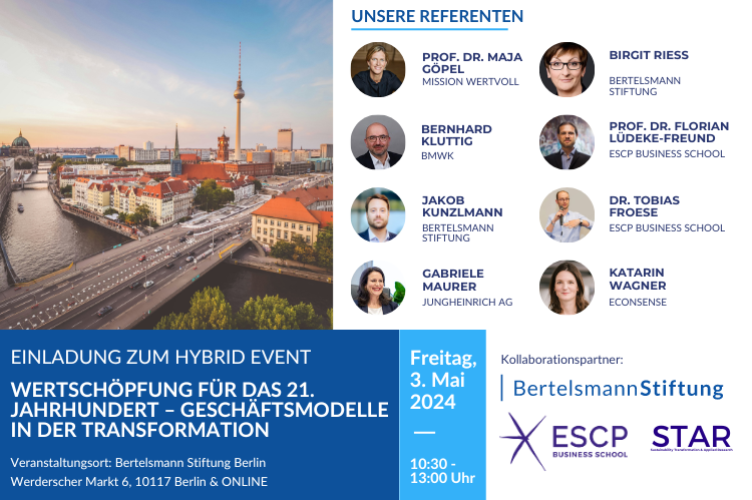EXECUTIVE SUMMARY
Our study shows: Germany's companies are changing! And more than that, it also shows that the more companies change their business models, the more they take sustainability into account!
For this study, 500 companies from the real economy were surveyed on the topic of "sustainable business model transformation". This representative survey provides a unique database that reveals the prevalence of sustainable business model changes in the German economy. We also conducted interviews with selected companies in order to gain in-depth insights into the practice of business model transformation.
Our study offers a multifaceted and detailed look at the transformation maturity of German companies. The following key findings summarize the most important insights.
The transformation maturity of German companies
Key finding 1: Business model transformation and sustainability orientation are interdependent: our study reveals a groundbreaking correlation: the more companies change their business model, the more they embed sustainability in their strategic goals and corporate activities - and vice versa.
Key finding 2: The majority of German companies are on the way to changing their business model: Almost two thirds of German companies are taking their first steps as adaptors; a further 15% can even be classified as innovators of a dynamic and sustainability-oriented transformation of the economy. For around one in two companies such changes to their business model directly lead to the development of new business areas.
Germany's companies in the sustainability transformation
Key finding 3: The potential for the sustainable transformation of Germany's corporate value creation is immense: for the majority of companies (60%), sustainability has been a driving force in the transformation of their activities and business models over the last ten years. Looking into the future, many companies also see previously untapped opportunities to change individual activities (just under 70%) or even their business model as a whole (just under 50%).
Drivers of and obstacles to sustainable business model transformation
Key finding 4: Economic interests are at the forefront of business model changes - even in the case of sustainability-related changes: Promising business cases are the most important driver for changing business models. The focus is primarily on customers, cost and efficiency potential. Civil society and NGOs as well as banks and investors, on the other hand, do not play a major role in business model changes.
Key finding 5: In retrospect, the role of politics as a facilitator of transformation thus far is seen as less beneficial, but deemed as essential when looking ahead: almost half of German companies see politics and regulation as an obstacle to past changes. At the same time, over 83% of companies recognize the crucial role of politics and regulation for the future sustainable transformation of their business models.
Paths and forms of sustainable business model transformation
Key finding 6: Ecologically designed products and services as well as consideration of the circular economy are the most common forms of sustainable business model transformation: Over 60% of German companies are primarily addressing the core of their offering by redesigning their products and services to be ecologically oriented. This is closely followed by the improvement of material cycles (e.g. recycling).
Key finding 7: Business model innovators focus on the change to service offerings and sustainability innovators take care of their supply chains: While business model innovators place great emphasis on the change from product-centered to service-oriented business models and actively drive this development, sustainability innovators are intensively concerned with improving their supply chains.
Opportunities and risks of sustainable business model transformation
Key finding 8: Changing customer needs, decarbonization and the circular economy are the greatest sustainability opportunities for Germany's business models, but employees have the greatest influence, both as an opportunity and a risk: Looking at current sustainability developments, over half (53.3%) of companies see the rising sustainability-oriented expectations of their customers as a significant opportunity for their business model. Similarly, just under 40% of companies see decarbonization and the establishment of a circular economy as opportunities. In addition, there is another decisive factor: although opinions are divided when it comes to the expectations of current and future employees - are they a risk or an opportunity? - only very few companies (approx. 25%) state that employee expectations have no influence.
Campuses
